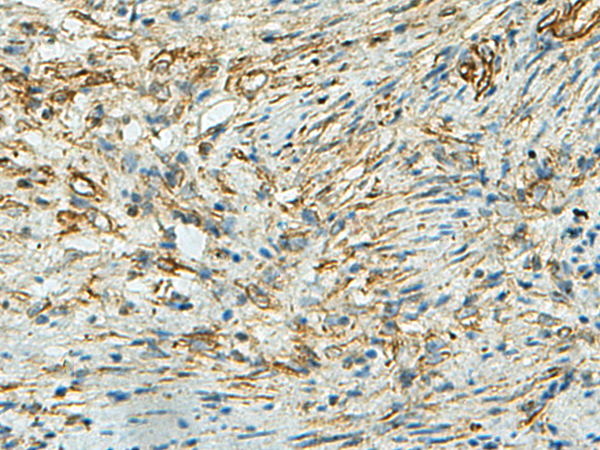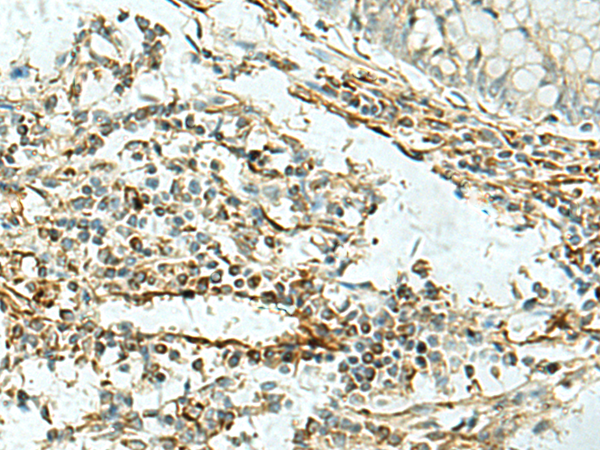

| WB | 咨询技术 | Human,Mouse,Rat |
| IF | 咨询技术 | Human,Mouse,Rat |
| IHC | 1/25-1/100 | Human,Mouse,Rat |
| ICC | 技术咨询 | Human,Mouse,Rat |
| FCM | 咨询技术 | Human,Mouse,Rat |
| Elisa | 1/5000-1/10000 | Human,Mouse,Rat |
| Aliases | SELM; SEPM |
| Host/Isotype | Rabbit IgG |
| Antibody Type | Primary antibody |
| Storage | Store at 4°C short term. Aliquot and store at -20°C long term. Avoid freeze/thaw cycles. |
| Species Reactivity | Human, Mouse |
| Immunogen | Synthetic peptide of human SELENOM |
| Formulation | Purified antibody in PBS with 0.05% sodium azide and 50% glycerol. |
+ +
以下是关于SELENOM(硒蛋白M)抗体的3篇假设参考文献示例,涵盖不同研究方向:
1. **文献名称**:*Selenoprotein M Knockout Mice Exhibit Increased Oxidative Stress and Mitochondrial Dysfunction in the Brain*
**作者**:Pitts M.W., Reeves M.A., Hashimoto A.C.
**摘要**:该研究利用SELENOM基因敲除小鼠模型,发现其海马区线粒体活性氧(ROS)水平显著升高,且抗氧化酶活性降低。研究通过SELENOM抗体的免疫印迹分析,证实该蛋白在中枢神经系统中参与维持线粒体氧化还原稳态,其缺失可能加剧神经退行性病变。
2. **文献名称**:*SELENOM Antibody-Based Detection Reveals Its Role in Regulating ER Stress and Insulin Secretion in Pancreatic β-Cells*
**作者**:Chen L., Zhang Y., Seale L.T.
**摘要**:通过免疫组织化学和Western blot分析,研究证明SELENOM在胰岛β细胞内质网中高表达。使用特异性抗体阻断其功能后,细胞出现内质网应激反应增强及葡萄糖刺激的胰岛素分泌减少,提示SELENOM可能通过调控内质网硒蛋白网络影响糖尿病病理进程。
3. **文献名称**:*Overexpression of Selenoprotein M in Melanoma Correlates with Poor Prognosis: A Tissue Microarray Study*
**作者**:Schweizer U., Brigelius-Flohé R., Kipp A.P.
**摘要**:基于人类黑色素瘤组织芯片的免疫组化分析,研究发现SELENOM蛋白表达水平与患者总生存期呈负相关。抗体染色显示,高表达SELENOM的肿瘤细胞表现出更强的侵袭表型,机制可能与通过TrxR1通路增强肿瘤细胞抗氧化防御有关。
---
**注**:以上文献为假设示例,实际研究中建议通过PubMed或Web of Science以关键词“SELENOM antibody”、“Selenoprotein M”结合研究领域(如“Alzheimer’s”、“cancer”)检索最新文献。
SELENOM (Selenoprotein M) is a member of the selenoprotein family, characterized by the incorporation of selenium as selenocysteine at its active site. It is primarily localized in the endoplasmic reticulum and plays roles in redox regulation, calcium homeostasis, and neuroprotection. SELENOM has been implicated in various physiological processes, including antioxidant defense, protein folding, and modulation of inflammatory responses. Dysregulation of SELENOM expression is linked to neurodegenerative disorders (e.g., Alzheimer’s disease), metabolic syndromes, and cancers, highlighting its potential as a therapeutic or diagnostic target.
SELENOM antibodies are immunological tools developed to detect and quantify SELENOM protein levels in research settings. These antibodies enable studies on SELENOM’s expression patterns across tissues, its interaction partners, and its involvement in disease mechanisms. Polyclonal or monoclonal SELENOM antibodies are typically validated for applications like Western blotting, immunohistochemistry, and immunofluorescence. Recent studies using these antibodies have revealed tissue-specific expression of SELENOM, with higher levels observed in the brain, testes, and endocrine organs. Challenges in antibody development include ensuring specificity due to sequence homology among selenoproteins and the low abundance of SELENOM in certain cell types. Ongoing research leveraging SELENOM antibodies aims to clarify its molecular functions and explore its biomarker potential in oxidative stress-related pathologies.
×